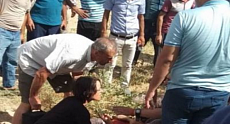China to grow potatoes on dark side of the Moon

Almaty. January 4. Silkroadnews - China plans to grow potatoes on the dark side of the Moon, TeleSUR reports.
“In a series of lunar launches this new year, China wants to be the first Earthly nation to land on the moon’s dark side,” the report said.
Chang’e 4 or C4 missions will conduct space exploration research. The first mission, to be held in June, will deliver a 425-kilogram relay satellite to the dark side of the Moon to provide communications with Earth.
Then China will launch a lander and rover on the dark side of the Moon, following the signal from the satellite newly set. The second mission will also deliver aluminum containers with seeds and insects from our planet. Chinese researchers hope to study the process of growth and development of terrestrial plants and insects on the Moon.
“The container will send potatoes, arabidopsis seeds and silkworm eggs to the surface of the moon. The eggs will hatch into silkworms, which can produce carbon dioxide, while the potatoes and seeds emit oxygen through photosynthesis. Together, they can establish a simple ecosystem on the moon,” the agency quoted saying by Zhang Yuanxun, container chief designer.
The containers will be insulated to protect the earth life the moon’s comparatively extreme temperatures. Aluminum containers will also be equipped with lighting to mimic the natural habitat of seeds and animals. Lighting will be provided by high-energy batteries.
Since 2013, the Chinese government has begun to pay more attention to space research. Five years ago, the Chinese research module landed on the moon. The space mission Chang’e 5 has already been launched to deliver lunar soil samples to Chinese research laboratories. Experts say, this is a response to the statement by the U.S. President Donald Trump saying he wants to revive the exploration of space.
According to the space exploration analyst Brian Harvey, China will be able to send people to the moon in the 2030s, bypassing the United States. “We're still no more definite about when the Americans will set foot back on the moon,” Harvey said.


